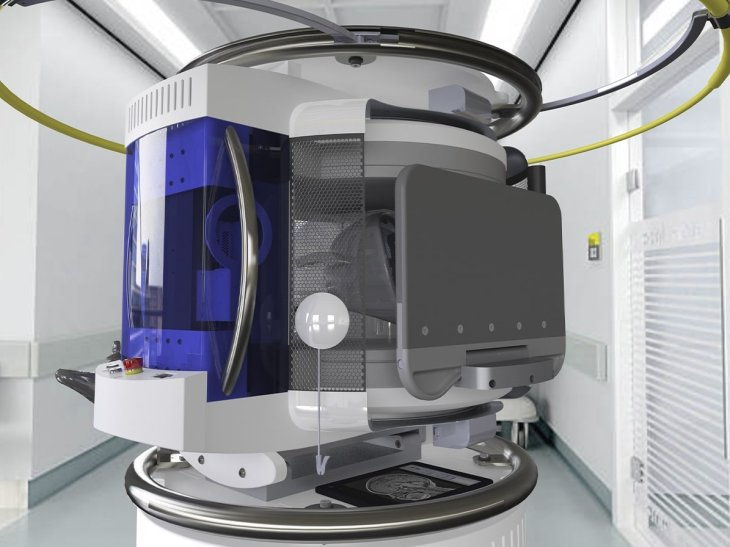First-Ever Portable MRI Machine Is 10 Times Lighter And 20 Times Cheaper
Harin - Feb 22, 2020

Hyperfine has developed a portable MRI machine that can be moved around from rooms to rooms and kept at the bedside for scanning.
- This Guy Turned A 90YO Typewriter Into An EDM Drum Machine To Play Music And It's Awesome!
- This Ridiculous, Useless Machine Takes Longer Than A Lifetime To Complete One Rotation
- With Just A Single Drop Of Blood, This Machine Can Detect 13 Different Types Of Cancer
When we hear MRI machines, we think about giant tube-like machines where patients are put inside a hollow tube. For people who suffer from claustrophobia, this is a nightmare.
Conventional MRI machines look huge, are immobile and cost a lot. This also means that a patient needs to come to a dedicated room. They are then put on a tray to be taken into the machine for scanning. But what if the patient isn’t in a condition that can be brought into the scanning room? Unfortunately, the patient can’t be scanned and receive adequate treatment. To fix this, researchers have come up with a solution.
Hyperfine has developed a portable MRI machine. The machine can be moved around different rooms and kept at the bedside. Compared to the cost of conventional MRI machines, the price of this portable one is only $50,000. The machine is equipped with a 0.0064 Tesla magnet, which is 10 times less power than 1.5T MRI machines.

Moreover, patients don’t need to go into a room that doesn’t have any metal objects. They can use the machine even when they are wearing watches, belts or jewelry. These are not allowed when using regular MRI machines.
This machine has just received approval from the FDA on the same day the study on it was published. The study involved 85 stroke patients using the portable machine for one week. Among these patients, only six underwent claustrophobia and some couldn't fit into the machine. The rest had positive results.
With the clearance, the machine can now be used to scan patients who are two years old and above.
MD and Senior Author, Yale School of Medicine’s chief physician, Kevin Seth said:

>>> This Futuristic X-Ray Machine Can Replace Its Bulky Counterparts In Hospitals
Featured Stories

Features - Jan 29, 2026
Permanently Deleting Your Instagram Account: A Complete Step-by-Step Tutorial

Features - Jul 01, 2025
What Are The Fastest Passenger Vehicles Ever Created?

Features - Jun 25, 2025
Japan Hydrogen Breakthrough: Scientists Crack the Clean Energy Code with...

ICT News - Jun 25, 2025
AI Intimidation Tactics: CEOs Turn Flawed Technology Into Employee Fear Machine

Review - Jun 25, 2025
Windows 11 Problems: Is Microsoft's "Best" OS Actually Getting Worse?

Features - Jun 22, 2025
Telegram Founder Pavel Durov Plans to Split $14 Billion Fortune Among 106 Children

ICT News - Jun 22, 2025
Neuralink Telepathy Chip Enables Quadriplegic Rob Greiner to Control Games with...

Features - Jun 21, 2025
This Over $100 Bottle Has Nothing But Fresh Air Inside

Features - Jun 18, 2025
Best Mobile VPN Apps for Gaming 2025: Complete Guide

Features - Jun 18, 2025
A Math Formula Tells Us How Long Everything Will Live
Read more

Mobile- Feb 17, 2026
Anticipating the Samsung Galaxy S26 and S26+: Key Rumors and Specs
The Samsung Galaxy S26 series is on the horizon, sparking excitement among tech enthusiasts.

ICT News- Feb 18, 2026
Google's Project Toscana: Elevating Pixel Face Unlock to Rival Apple's Face ID
As the smartphone landscape evolves, Google's push toward superior face unlock technology underscores its ambition to close the gap with Apple in user security and convenience.

Mobile- Feb 16, 2026
Xiaomi Launches Affordable Tracker to Compete with Apple's AirTag
For users tired of ecosystem lock-in or high prices, the Xiaomi Tag represents a compelling, no-frills option that delivers core functionality at a fraction of the cost.
Comments
Sort by Newest | Popular